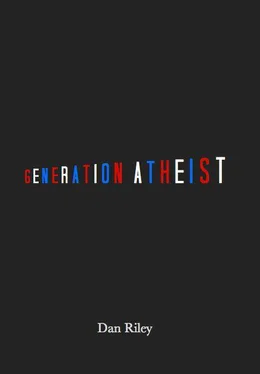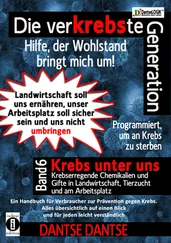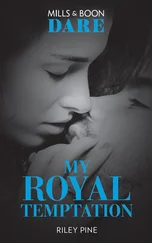The first meeting I attended was in November of 2010. I was under the impression that I was going to go and that the meeting was really just a formality, which they had to have because of technicalities. I assumed that the subcommittee would realize that the banner was illegal and take it down. I thought that I was just going as an observer. I was planning to speak if I felt the need to, but I didn’t really want to. I’ve always been incredibly shy.
At the meeting, my jaw dropped. Most of the people there wanted the prayer to stay. They were saying, “We need to have God.” Some people were saying, “It’s not even a prayer.” Other people were saying, “It includes all monotheistic religions.” Other people were saying, “It’s historic.” I was stunned. I thought the grownups would know that it was illegal and know what to do. I spoke that night. When I did, I stood up, and for the first time in my life, I publicly said that I was an atheist. I hadn’t previously told most of my classmates; none of my teachers knew. I said, “As an atheist student, this prayer is discriminating against me.“ Someone gasped. Other people started whispering. At one point during the meeting, I stood to speak again, and when I sat down, the former nominee for the Lieutenant Governor of Rhode Island, Kara Russo, called me a witch under her breath. At the end of the meeting, the subcommittee agreed that they needed to have another meeting because they hadn’t come to a solution. After the meeting, I was on the news. I remember getting in the car afterward and feeling really overwhelmed because it went completely differently than I had expected.
After being on the news, in school it was a little weird, but at that point it didn’t seem like it would be a big deal. A lot of people still didn’t even know about the prayer controversy. I had created a Facebook group in support of removing the prayer. After I was on television, there were 150 people in the group. Most people joined and said, “I’m an atheist, thank you for doing this.” It was very encouraging because I really hated the meeting. I didn’t want to go back to another one, but I planned to do so. I felt sick every time I thought about it.
The next meeting was in February 2011. That meeting was much bigger. We had to use a different room than was originally reserved because there were so many people, and the original room couldn’t accommodate everyone. The overwhelming majority of people there were in favor of keeping the prayer. They showed up led by former candidate for mayor of Providence, Chris Young, and his fiancée, Kara Russo. They are two of the most passionate Catholics I have ever known. At the first meeting Kara had repeatedly said that people needed God in their life, that they didn’t want to be on the wrong side. They made me realize that people really are trying to put religion into our government; people really are trying to infiltrate our secularity. To me, that’s scary, because as an atheist, I fear for how they would change the country.
There was a massive amount of prayer support. All the prayer banner supporters showed up with paper and string signs around their necks that read “Keep Original Banner.” They were really angry. They didn’t like atheists; they started yelling about the “atheist’s agenda.” They were criticizing atheists and saying that I was a puppet. I felt belittled and scared. I expected them to act a bit more civilly, especially toward a 15-year-old. I wanted to leave, go home, and cry for awhile.
At one point during the meeting, people were saying that if I had a problem with God, I should go to a different school, which was really frustrating for me because Cranston High School West is a public school. If people want God in school, then they should go to a private school; no atheist really cares about that. No one wants to take that right away. I was trying to say that what was happening with the prayer banner is illegal. I wasn’t trying to speak out as an atheist per se, but they kind of turned it into a religious war.
At the end of that meeting, the subcommittee decided to have yet another meeting. The next meeting was in March and was even bigger than the last one had been. We had maybe 10 people in support of removing the prayer, with over 100 people there who wanted to keep the prayer in my school. It was very difficult for me to speak in front of those people. When the prayer supporters got up to speak, they wouldn’t just argue about keeping the prayer. They would say things about atheists, how bad they are, how atheists have an agenda, and that we’re socialists. At one point one woman went up to speak, and she told everyone to take out a dollar bill. She took out a dollar bill and said, “Hold it to your head. I want everyone in this room who doesn’t believe in God to rip it in half.” When none of us did, she said that was proof that the prayer should stay, emphasizing that In God We Trust is on the money. I still don’t really understand what her point was.
At the fourth meeting, the vote was held. The result was a vote of four to three in favor of keeping the prayer and fighting the ACLU. I remember at the first meeting the superintendent had said, “If you want to pray, maybe you should go to church. I’m a Catholic. I go to church every Sunday, and I see a lot of empty pews around me.” I was on board with that. I thought that was pretty cool. No one’s trying to take away religion; we’re just trying to separate religion from public schools. He seemed to be on the side of taking it down, but when it was his turn to vote he said, “I think that the prayer should stay; we need it there” and voted to keep it in the school. It seemed like the majority was scaring him and making him think that he wouldn’t get reelected if he didn’t vote to allow the banner to remain. That was a common theme with others on the subcommittee. They had started off rather neutral.
The ACLU then asked me to follow through with a lawsuit. They said, “If you would like to become a plaintiff in the case, we will represent you.” When I got that e-mail, I knew that I was going to say yes. It was important to me. It didn’t really matter that I would probably be facing a lot of hate for it. I wanted to do it because it seemed to me like the right thing to do. I’m not 18, so I needed a parent to give me permission. My dad said that it was entirely up to me, that this was a big decision, and that I could do it if I wanted to, but there shouldn’t be any pressure on me. After I said yes, I started to feel like it would be my fault if the school lost a lot of money defending the lawsuit. In the end, I decided to go through with it because I felt as though it was the school’s fault. They decided to keep the prayer. They could have taken it down, and they wouldn’t have had to deal with the lawsuit. It has taken a lot of time, a lot of energy, but it has definitely been worth it.
There’s one story that I must share. My school has a week every year called “Diversity Week,” and during this week, there are assemblies run by students who manage the whole thing. During the time of the prayer banner controversy, the mayor came. He’s Chinese-American. He gave a talk about minorities and how they’re often discriminated against. He talked about how even though he is a minority, he has been able to be successful. It was a nice little talk. At the end, there was a question and answer session. One student got the mic and asked, “Mayor Fung, how do you feel about the prayer in our school?” When I heard the question, I was a little bit nervous and surprised that the question had even been asked. He pointed to the prayer banner and said, “I want to see the prayer stay exactly where it is!” He was very dramatic and passionate as he pointed to it. Everyone in the auditorium jumped up and started cheering and clapping and moving and screaming. I wanted to run out of the room and cry because it seemed like I was the only person sitting down who didn’t like what he had said. People started looking at me, and I felt like such a freak. It was awful. The mayor didn’t seem to care that I was quite possibly in the room; he didn’t seem to have any concern for how I felt. It was also hurtful that none of the teachers came over to see if I was okay. Everyone seemed so happy that the mayor was on their side. I also found it very ironic that he was there talking about the discrimination of minorities, while saying that he thinks that the discriminatory prayer banner should stay in the school, hurting the feelings of atheists and other non-Christians who felt like they didn’t belong. I think the incident actually ended up making me a bit stronger, a bit tougher.
Читать дальше












